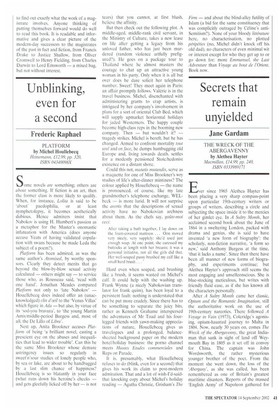Unblinking, even for a second
Frederic Raphael
PLATFORM by Michel Houllebecq Heinemann, £12.99, pp. 320, ISBN 04340098X Some novels are something; others are about something. If fiction is an art, then the former class is more likely to qualify. When, for instance, Lolita is said to be
'about' paedophilia, or at least nymphetolepsy, it becomes aesthetically dubious. Hence admirers insist that Nabokov is using H. Humbert's passion as a metaphor for the Master's onomastic infatuation with America (does anyone accuse Yeats of having validated copulation with swans because he made Leda the subject of a poem?).
Platform has been admired, as was the same author's Atomised, by worthy sponsors. Clearly they detect merits that go beyond the blow-by-blow sexual activity calculated — others might say — to service those who, as Rousseau said, 'read with one hand'. Jonathan Meades compared Platform not only to 'late Nabokov' — Houellebecq does indeed offer an (unacknowledged) clin d'wil to the 'Venus Villas' which figure in Ada — but also, by virtue of its .sod-you bravura', to 'the young Martin Arnisi'middle-period Burgess and, most of all, the De Lill° of Libra'.
Next up, Anita Brookner accuses Platform of being 'a brilliant novel, casting a prescient eye on the abuses and inequalities that lead to wider trouble'. Can this be the same Miss Brookner whose demure astringency issues so regularly in sweet'n'sour studies of lonely people who, by sea or lake, are about to be handbagged by a last slim chance of happiness? Houellebecq is so blatantly in your face (what runs down his heroine's cheeks — and gets gleefully licked off by her — is not
tears) that you cannot, at first blush, believe the affinity.
But then check out the following plot. A middle-aged, middle-rank civil servant, in the Ministry of Culture, takes a new lease on life after getting a legacy from his unloved father, who has just been murdered (random violence artfully prefigured?). He goes on a package tour to Thailand where he almost musters the courage to chat up an attractive young woman in his party. Only when it is all but over does he dare solicit her telephone number. Sweet! They meet again in Paris; an affair promptly follows. Valerie is in the travel business. Michel, disenchanted with administering grants to crap artists, is intrigued by her company's involvement in plans for a sort of oriental Club Bed, which will supply upmarket horizontal holidays for jaded Westerners. The happy couple become high-class reps in the booming new company. Then — but wouldn't it? — tragedy strikes. Michel is bereft, but he has changed. Armed to confront mortality tout seal and en face, he dumps humbugging old Europe and, living towards death, settles for a modestly pensioned Stoic/hedonist existence on a distant shore.
Could this not, mutatis mutandis, serve as a maquette for one of Miss Brookner's wry studies of life's after-dinner mintiness? The colour applied by Houellebecq — the name is pronounced, of course, like my late grandmother's telephone exchange, WELbeck — is more lurid. It will not surprise the avertis that the descriptions of sexual activity have no Nabokovian archness about them. As the chefs say, goate-moi ceci:
After taking a bath together, I lay down on the foam-covered mattress . . . Oon moved very nicely, very supplely: she'd used just enough soap. At one point, she caressed my buttocks at length with her breasts; it was a personal initiative, not all the girls did that. Her well-soaped pussy brushed my calf like a small hard brush
Hard even when soaped, and brushing like a brush, it seems wasted on Michel's calf. It could help with the washing up. Frank Wynne (a nicely Nabokovian translator for frank quim), has been loyal to a persistent fault: nothing is understated that can be put more crudely. Since there has to be something to separate the juicy bits, rather as Kenneth Grahame interspersed the adventures of Mr Toad and his fourlegged friends with yawn-making appreciations of nature, Houellebecq gives us travelogues and a prolonged, balancesheeted background paper on the modern hotel/holiday business: the porno channel meets Hautes Etudes commerciales and Reps on Parade.
It is, presumably, what Houellebecq refuses to do (blink, even for a second) that gives his work its claim to post-modern admiration. That and a lot of wish-I'd-saidthat knocking copy about Michel's holiday reading — Agatha Christie, Grisham's The Finn — and about the blind-alley futility of Islam (a bid for the same constituency that was complicitly outraged by Celine's antiSemitism?). None of your bloody litterature here, no characterisation, no plotted peripeties (no, Michel didn't knock off his old dad), no characters of even minimal wit or interest except for who they get up to or o down for: more Emmanuel, the Last Adventure than Voyage au bout de l'Ofient. Book now.










































































 Previous page
Previous page